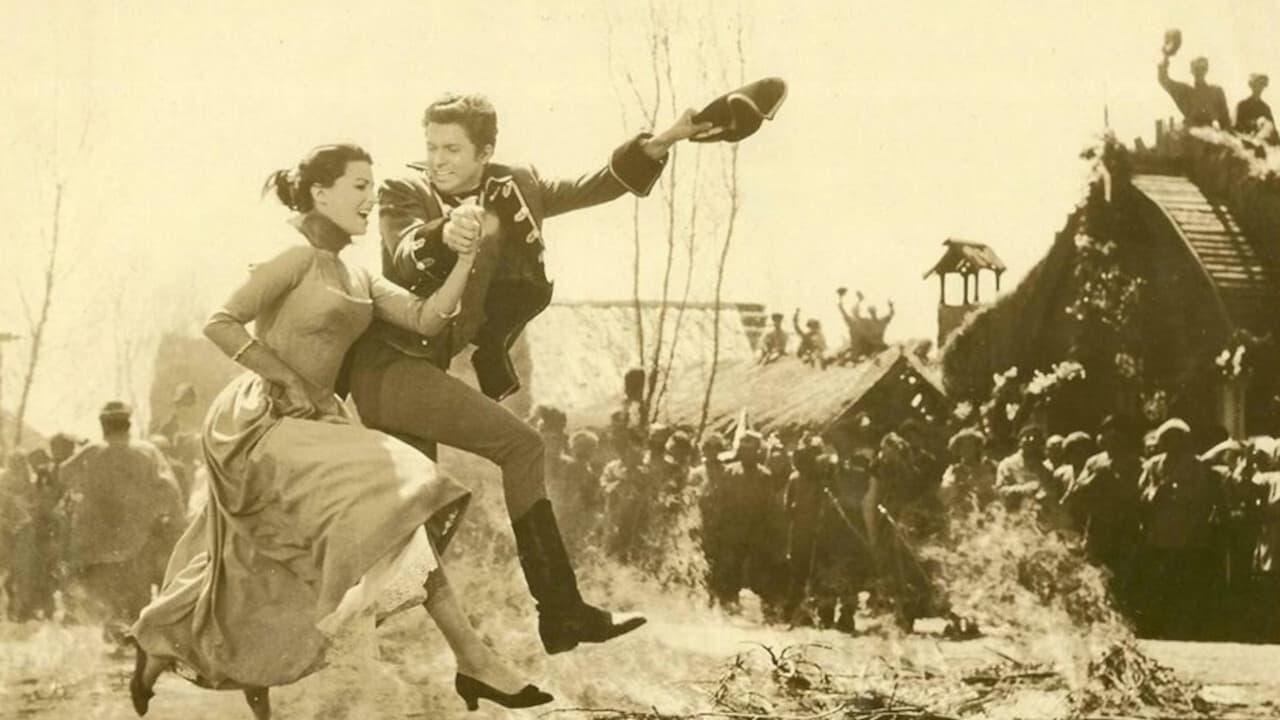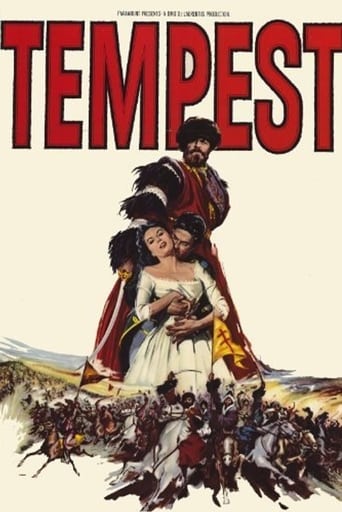

just watch it!
... View MoreAbsolutely the worst movie.
... View MoreIt is an exhilarating, distressing, funny and profound film, with one of the more memorable film scores in years,
... View MoreThe story, direction, characters, and writing/dialogue is akin to taking a tranquilizer shot to the neck, but everything else was so well done.
... View MoreI had missed a TV broadcast of this in the original Italian language as a kid though, recently, a snippet from an early sequence was shown during the introduction of the specialized "After Hours" program. Incidentally, these last couple of years I have been trying to land a serviceable copy of the film – both for myself and a film-buff friend of my Dad's – but, while this was the most satisfactory of three I had at some point, it still leaves a lot to be desired: gleaned from a German print (albeit Widescreen when the others were not) with the English dialogue mixed in, there remain several imperfections like audio drop-outs and fluctuating levels, while one brief scene is still presented in German with superimposed English subtitles! Anyway, the film was clearly made by mogul Dino De Laurentiis as a follow-up to another Russian-set epic, WAR AND PEACE (1956), which had been a co-production between the U.S. and Italy; this was a more European-based venture (inspired by an Alexander Pushkin tale), actually shot in Yugoslavia(!), though it still featured numerous English-speaking actors and a few of them were even ported over from the famed Leo Tolstoy adaptation (namely Oscar Homolka, Helmut Dantine and Vittorio Gassman). The others include Viveca Lindfors (as Catherine The Great – which is why I incorporated this in my current viewing schedule, as part of an intermittently progressing Josef von Sternberg retrospective), Van Heflin (as the pretender to her throne, a peasant who believes himself to be her deceased husband Peter III! – curiously enough, I have just checked out the thematically-related SHADOW OF THE EAGLE {1950} and which had actually employed a similar ruse), Geoffrey Horne (fresh from his secondary-cum-cowardly role in THE BRIDGE ON THE RIVER KWAI {1957} but now upgraded to lead/hero status), Robert Keith, Agnes Moorehead and Finlay Currie; the most notable element on the Italian front, then, is Silvana Mangano (Mrs. De Laurentiis herself) – obviously, albeit ably, filling in the female protagonist slot.Again, in comparison to WAR AND PEACE, this was given a manageable running-time of 122 minutes when the earlier film had lasted for a staggering 208 and, while that one recruited two directors and two cinematographers (one foreign and one local in each case), this would only utilize home-grown talent in either department (with d.p. Aldo Tonti being involved in both pictures as well) – though Michelangelo Antonioni, soon to embark on his major art-house period, was reportedly brought in for a brief stretch during filming, as would also be the case around this same time with the peplum SIGN OF THE GLADIATOR! In any event, apart from the rich and sprawling visuals (pertaining to scenery, costumes and battle sequences), the main asset here proves to be Piero Piccioni's rousing score.That is not to say that the plot is not involving – at least Heflin's bloodthirsty campaign, built more on his vainglorious personality (in the type of larger-than-life part Orson Welles would often get to play in such international productions) than actual battle tactics, and the no-less ruthless military strategies by which Catherine defeats the usurper (incidentally, the two leaders only get to meet briefly at the very end) – but it is bogged down somewhat by cliché (the eternal triangle situation involving Horne, Mangano and hissable villain Dantine), melodrama (Currie's disowning of son Horne after he is accused by the dying Dantine of treason) and sentimentality (not only long-suffering manservant Homolka's devotion to Horne but Heflin's enthusiastic attachment to same after having been saved by him from freezing to death).In conclusion, I would like to point out that I also own the 1928 American film by the same title with John Barrymore which, though still a Russia-based epic, it is set during the seminal 1917 revolution that toppled the monarchy once and for all though the Communist ideals of the Proletariat regime that came into power in its stead emerged pretty soon to be just as oppressive as the old system (the long-term result of which was the country's dismemberment into smaller independent states and its former reputation as a superpower getting severely diminished in the process)!
... View MoreDino DeLaurentis produced this fine film, Tempest, of Alexander Pushkin's novel set during the reign of Catherine the Great starring Van Heflin as the rebel pretender Pugachev who said he was really Czar Peter III who was Catherine's husband and whom she overthrew several years earlier. Viveca Lindfors plays a cool and calculating Empress Catherine.But the thing to remember is that this is not a work of history. Pushkin did write history as well, but this film is not history as such. It is based on Pushkin's novel The Captain's Daughter and the protagonists are Geoffrey Horne and Silvana Mangano. It is through their eyes that we see both their love and the background that led to this attempted revolution against Catherine.Young Horne for an indiscretion is sent in exile from Catherine's court to a frontier outpost commanded by Captain Robert Keith. With a little matchmaking help from her mother Agnes Moorehead the two are fated to be mated, eventually.But in the meantime the revolt of Pugachev is growing. As it turns out Horne and his servant Oscar Homolka saved the life of a frozen peasant on the way to the outpost. When Pugachev overruns their outpost, Horne's life is saved by the fact it's none other than Van Heflin now styling himself as Czar Peter.Heflin who was a consummate actor playing all kinds of everyman roles as an American transfers well as a Russian peasant. A whole lot better than Henry Fonda did as a Russian in War And Peace. But that's not the end for Horne. For his warnings about the growing discontent of the peasantry and Heflin's popularity with them, he gets himself into a nice little jackpot. Aided and abetted by the dying words of Helmut Dantine, another officer who actually did turn traitor to Catherine. Dantine also had eyes for Mangano.Pushkin was a romantic writer and Tempest first and foremost a love story just like Gone With The Wind against the epic background of a great war. As far as the novel goes, Tempest sticks fairly close to the plot of The Captain's Daughter. And the spirit of those times of Catherine the Great are captured in the novel and in this film.Tempest is a good historical epic which is sadly neglected today. I'm sure the Russians have adapted this same story, maybe better. But this is a fine version as is for the English speaking world.
... View MoreThere has been not many films on Russian historical events (other than local products). "Tempest" is a co-production (French, Italian and Yugoslavian) that deals with a cossack uprising against empress Catherine II's ruling in Russia. It is in my opinion a very acceptable movie rather accurate to facts in its underground and with a fine screenplay in the surface.The plot is interesting and precisely managed by Italian Director Alberto Lattuada. The film doesn't lack spectacle and intensity with fine battle scenes and action sequences that could qualify it as a true epic. Wide open outdoor color shooting and good interior settings also help the product.But what really hurts the picture, and badly, is the important role of Russian officer Grinov played by a completely miscast-ed Geoffrey Horne. He just doesn't fit at all as the man who unknowingly saves the rebels leader life and from then on is the character that allows viewers to know about Pugachov's reasons and ideas that led him to raise against the empress in an almost impossible task. Horne's acting is definitely poor and he lacks the strength and passion his role demands. On the other hand, Van Heflin does a very good work and plays most convincingly Emelyan Pugachov the man who dared to challenge the powerful Catherine (in fact I can't recall a bad performance from Heflin in films). The rest of the cast is correct, mainly Agnes Moorehead, Oskar Homolka, Silvana Mangano (you just can't understand how she could fall in love with Horne's dull and inexpressive character) and Viveca Lindfors as the empress.But all in all "Tempest" is a watchable and most entertaining film in its genre.
... View MoreCheck out the cast. Van Heflin is always worth watching. If you like historical drams, you will probably like this movie. I certainly did. Also, Lindfors, whom I've always liked, Homolka, etc. Give it a try. While it has been many years since I have seen this movie, I remember it well enough to want to buy a copy. I am a sucker for epics and will sit through some that others might not want to, but I do think this one is good enough to recommend. As I remember, the Catherine is quite good and lovely. And I have been a fan of Viveca Lindfors since the fifties. It was great to see her again in Stargate. Do you remember The Story of Ruth? Tempest is kludgy perhaps in places, but good.
... View More